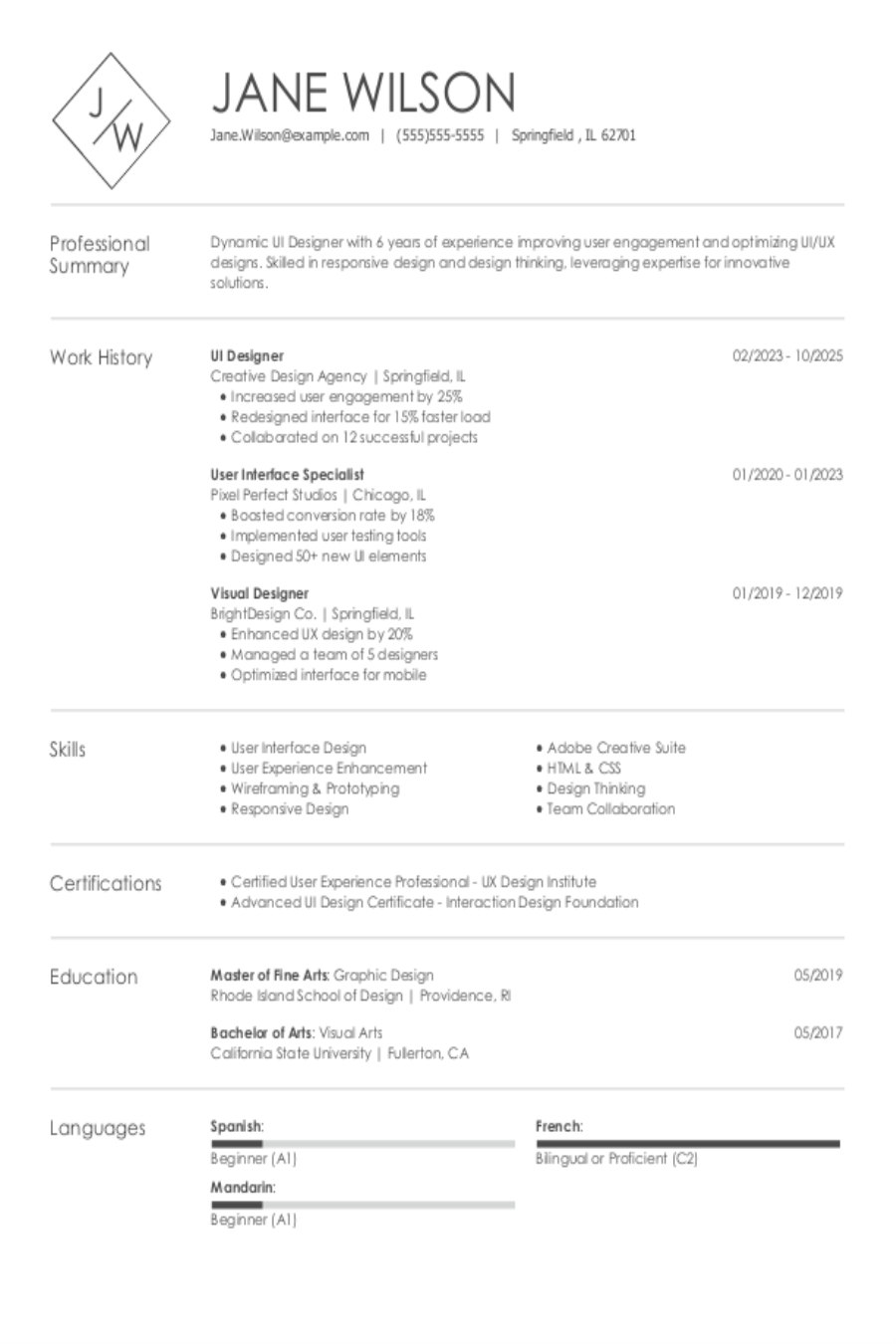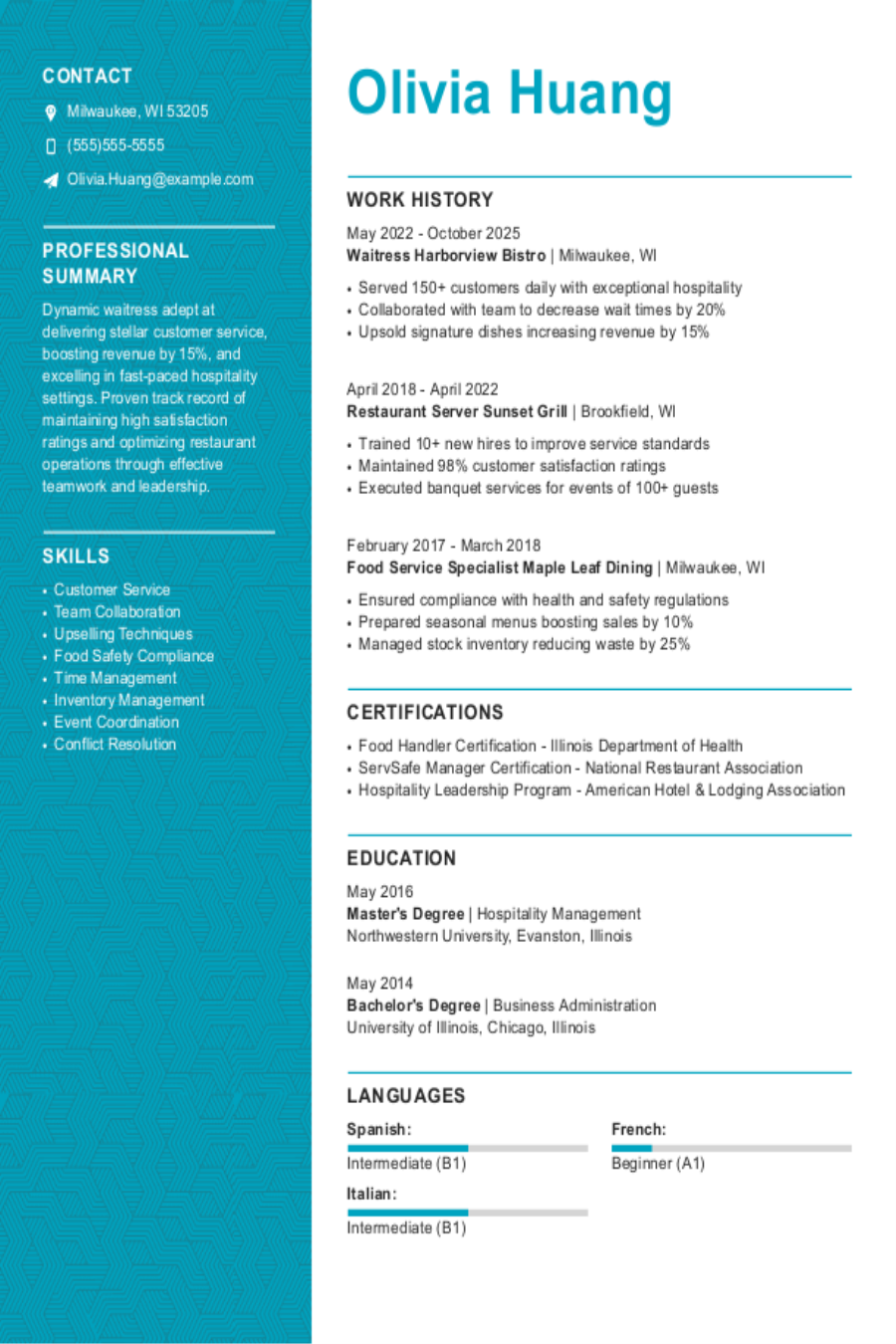Retail marketing is a fast-paced and exciting field that brings together creativity, strategy and consumer behavior. Whether you're helping customers discover new products in-store or crafting targeted online campaigns, retail marketers play a vital role in boosting sales and enhancing brand visibility.
As the retail landscape continues to evolve with the rise of e-commerce and omnichannel strategies, there's never been a better time to pursue a career in this industry. Not only does retail marketing offer a variety of roles but it also gives you the chance to make a direct impact on how customers interact with brands.
In this guide, you'll learn about:
- The different types of retail marketing jobs available.
- The essential skills you'll need to succeed.
- Tips on crafting a resume that stands out to employers.
- How to prepare for interviews and market yourself effectively.
Want More Help Kick-starting Your Career In Retail Marketing? Try out our easy-to-use AI Resume Builder to create a professional resume that highlights your skills and experience in retail marketing. Upload your resume or make a new one in just a few clicks.
What Is Retail Marketing?
Retail marketing refers to the strategies businesses use to promote their products and services directly to customers.
The goal of retail marketing is to create a seamless shopping experience, whether online or in-store, that attracts customers, encourages them to make purchases and builds brand loyalty.
This involves multiple techniques, including in-store promotions, social media advertising, email marketing and search engine optimization (SEO). Retail marketers focus on understanding customer behavior, creating targeted campaigns and analyzing results to refine their strategies.
At its core, retail marketing revolves around four key elements:
- Product: The items or services being sold.
- Price: Setting competitive prices while maximizing profit.
- Place: Ensuring the products are available where customers can easily purchase them.
- Promotion: The tactics used to raise awareness and drive sales, such as advertising, sales or special events.
As greater emphasis on e-commerce and omnichannel experiences grows, retail marketing has expanded to include digital campaigns that engage customers at every stage of their shopping journey, making them essential to the success of many modern businesses.
Why Choose a Career in Retail Marketing?
A career in retail marketing offers the chance to be part of an ever-evolving industry that mixes creativity with data-driven strategy.
Here are a few reasons why retail marketing is a rewarding field for many professionals:
- Make a Real Impact: Retail marketing professionals directly influence how customers experience brands, from the moment they learn about a product to the point of purchase.
- Creative Problem-solving: Whether you're designing a new in-store display or developing a digital campaign, retail marketing allows you to think outside the box and create solutions that attract and engage customers.
- Versatility: The skills you develop in retail marketing, such as campaign management and data analysis, are transferable across industries, providing ample opportunities for career growth.
- In-demand Skills: With the rise of e-commerce and omnichannel retail, businesses are always on the lookout for skilled marketers who can adapt to changing consumer behaviors and leverage digital tools to drive sales.
Types of Retail Marketing Jobs
Retail marketing offers a wide range of career opportunities, each requiring a unique combination of creativity, analytical skills and strategic thinking.
Whether you're focused on in-store customer experiences or driving online sales through digital channels, there's a role in retail marketing for you.
Below are some of the most common retail marketing jobs:
- Retail Marketing Manager: This role involves overseeing both in-store and online marketing campaigns. Retail marketing managers are responsible for creating and executing strategies that increase foot traffic, drive sales and improve brand visibility. They also manage marketing budgets and analyze campaign performance to ensure return on investment (ROI).
- Digital Marketing Specialist: Digital marketing specialists focus on driving e-commerce sales and building a brand's online presence. They handle search engine optimization (SEO), pay-per-click (PPC) advertising, email marketing and social media campaigns to attract and engage customers online.
- Visual Merchandiser: Visual merchandisers design in-store product displays that are both visually appealing and strategically placed to encourage purchases. They combine creativity and marketing know-how to influence customers' buying decisions right from the moment they walk into a store.
- Brand Manager: A brand manager is responsible for developing and maintaining a brand's image and messaging. This role involves working closely with marketing teams to create campaigns that align with the company's overall brand strategy and resonate with the target audience.
- Customer Insights Analyst: Customer insights analysts use data to better understand consumer behavior. They analyze sales trends, customer feedback and purchasing patterns to help marketing teams make data-driven decisions that enhance customer experiences and improve marketing strategies.
Essential Skills for Retail Marketing Professionals
Succeeding in retail marketing requires a well-rounded skill set that blends a wide range of technical and interpersonal abilities.
This means you must have both hard skills, like data analysis, and soft skills, such as adaptability, to effectively fulfill your responsibilities.
Employers look for candidates who can craft effective marketing campaigns, interpret consumer data and adapt to the fast-paced nature of the retail world.
With that in mind, here are some of the essential skills you'll need to thrive in this field:
Hard Skills:
- Data Analysis: Retail marketers must analyze data to understand consumer behavior, track sales trends and measure campaign performance. Proficiency with tools like Google Analytics, customer relationship management (CRM) software and Excel is crucial for interpreting data and optimizing marketing strategies.
- SEO and SEM (Search Engine Optimization & Search Engine Marketing): Digital marketing plays a huge role in retail marketing, especially for e-commerce brands. Retail marketers need to know how to optimize websites for search engines (SEO) and create paid search campaigns (SEM) that attract potential customers and drive online traffic.
- Social Media Marketing: With the increasing influence of social media, retail marketers need to develop strong skills in managing and creating content for platforms like Instagram, Facebook, TikTok and LinkedIn. This includes understanding paid social ads, influencer marketing and engagement strategies.
- Campaign Management: Retail marketers are responsible for planning and executing marketing campaigns across various channels, including email, social media and in-store promotions. Understanding how to manage timelines, budgets and vendor relationships is essential to executing successful campaigns.
- E-commerce and Digital Marketing Platforms: Familiarity with e-commerce platforms like Shopify, Magento and BigCommerce, as well as tools like HubSpot and MailChimp, is critical for driving online sales and managing customer interactions.
Soft Skills:
- Communication: Whether working with internal teams or external vendors, effective communication is key in retail marketing. You'll need to clearly articulate campaign goals, collaborate with colleagues and present ideas to stakeholders.
- Creativity: In a competitive retail landscape, marketers must constantly come up with innovative ideas that capture consumer attention. From designing visually appealing in-store displays to creating engaging online ads, creativity is essential to standing out.
- Adaptability: The retail environment is fast-paced and consumer preferences can change quickly. Being flexible and able to adapt to new trends, technologies and consumer behaviors will help you stay ahead of the curve.
- Leadership and Team Management: Many retail marketing roles, such as marketing managers, require the ability to lead teams and delegate tasks effectively. Strong leadership skills help ensure projects run smoothly and everyone is aligned toward the same goals.
- Problem-solving: Marketers face challenges like budget constraints, changing consumer preferences or technical issues. Being able to think critically and come up with creative solutions is a vital part of the job.
How to Write a Retail Marketing Resume
Your resume is the first opportunity to show employers that you have the skills and experience to succeed in retail marketing. Writing a resume that highlights your marketing expertise, creativity and results-driven approach is key to standing out in this competitive field.
Here's how to write a retail marketing resume that gets noticed:
Step 1
Choose the Right Resume Format
The chronological resume format is usually the most popular choice for retail marketers, as it emphasizes your work experience. This resume format showcases your career progression and achievements in marketing roles, making it easier for employers to see how your skills have developed over time.
If you're transitioning into retail marketing from another field, the combination resume format might be more appropriate. It allows you to highlight your transferable skills and relevant experience at the top, followed by a concise work history section.
Although less common, if you lack experience you can also consider the functional resume format, which places more focus on skills at the expense of work history.
Whichever format you choose, use a clean, professional template that organizes your content clearly and is easy to read, taking care to make your resume friendly for applicant tracking systems (ATS).
Step 2
Write a Compelling Resume Profile (Summary or Objective)
Your resume profile is the first thing hiring managers see, so it's important to make a strong first impression.
You can choose between a resume summary or an objective, depending on your experience level.
- Resume Summary: Best for candidates with several years of experience in retail marketing. A summary concisely highlights your most relevant skills, achievements and career goals.
- Resume Objective: Best for entry-level candidates or those transitioning into retail marketing from another field. An objective focuses on your career goals and what you hope to achieve in the role.
Retail Marketing Resume Summary Example:
Results-driven retail marketing professional with over five years of experience developing and executing cross-channel marketing campaigns. Proven track record of increasing online sales by 35% and boosting brand visibility through targeted social media strategies. Skilled in data analysis, campaign management and team leadership.
Retail Marketing Resume Objective Example:
Creative and driven marketing professional seeking to leverage skills in digital marketing and consumer behavior in a retail marketing role. Eager to contribute to brand growth and customer engagement through innovative online campaigns.
Tailor your resume profile to the specific job you're applying for by highlighting the most relevant skills and achievements based on the job description.
Step 3
Highlight Your Work Experience
Your work experience section should be tailored to the specific retail marketing job you're applying for. Focus on your accomplishments, particularly those that demonstrate your ability to drive results.
Numbers speak volumes in retail marketing, so whenever possible, include metrics that demonstrate how your work contributed to the company's success.
Did you increase sales, boost website traffic or improve customer engagement? Quantifying your accomplishments shows employers that you can deliver tangible results.
Also, take care to avoid vague language like "responsible for." Instead, use action verbs like "developed," "managed," "increased" and "optimized."
Retail Marketing Work Experience Example:
Digital Marketing Manager
Generic Tech Industries
Austin, TX
09/2019 – 10/2024
- Managed a $200K annual marketing budget, leading to a 25% increase in brand awareness over 12 months.
- Developed and executed multichannel marketing campaigns, resulting in a 30% increase in online sales within Q3 of 2023.
- Implemented SEO strategies that improved website traffic by 50% year over year.
Incorporate marketing-related keywords from the job description to help your resume pass applicant tracking system (ATS) filters.
Step 4
Focus on Relevant Skills
As stated earlier, employers in retail marketing look for a combination of technical and interpersonal skills. Create a dedicated skills section that highlights both your hard and soft skills. Mention specific tools and platforms you've worked with, such as Google Analytics, HubSpot or Facebook Ads Manager, along with key soft skills like communication and leadership.
Example Skills for a Retail Marketing Resume:
- Google Analytics, SEMrush and Moz
- SEO and SEM strategy development
- Email marketing (MailChimp, Constant Contact)
- Social media marketing (Instagram, Facebook Ads)
- Team leadership and project management
- Data-driven decision-making
Step 5
Add Your Education
Your education section is important, especially if you're new to the retail marketing field. While many marketing roles prioritize experience and skills over formal education, listing relevant degrees can underscore your qualifications.
Example:
Bachelor of Science in Marketing
University of California, Los Angeles
Step 6
Add Optional Sections
If you have the space, you can enhance your resume by adding optional relevant sections such as certifications, languages or professional development.
For example, if you've completed a certification in digital marketing or Google Analytics, include it to demonstrate your commitment to professional growth.
Certifications to Consider:
- Google Analytics Certification
- HubSpot Inbound Marketing Certification
- Facebook Blueprint Certification
- Digital Marketing Institute Certification
How to Prepare for Retail Marketing Interviews
Once your resume has landed you an interview, it's time to showcase your skills, experience and enthusiasm for retail marketing.
Hiring managers want to see if you are someone who fits the company's values and works well with others. Therefore, retail marketing interviews often focus on both your technical abilities and your creativity in executing campaigns.
Here's how to prepare for a successful interview:
Research the Company and Its Marketing Strategies
Before your interview, take the time to thoroughly research the company. Understand their brand, target audience and marketing strategies. Look at their social media presence, recent campaigns and website content.
Being familiar with the company's marketing initiatives will allow you to tailor your answers to show how you can contribute to their specific goals.
Practice Common Retail Marketing Interview Questions
Employers want to gauge both your technical skills and your ability to think creatively under pressure. Prepare for questions that cover a range of topics, including campaign management, data analysis and problem-solving.
Here are a few common questions you might encounter:
- Can you walk me through a successful marketing campaign you managed? Focus on the steps you took from planning to execution and include the results (e.g., increased sales or improved engagement).
- How do you measure the success of a marketing campaign? Mention key performance indicators (KPIs) such as return on investment (ROI), conversion rates and customer engagement metrics.
- How would you approach a drop in sales for an established product? Discuss strategies like revisiting the target audience, adjusting promotions or revamping the product's messaging to increase interest.
- How do you stay current with retail marketing trends? Employers appreciate candidates who are proactive about learning. Mention blogs, podcasts or courses you follow, as well as any industry events you attend.
Use the STAR method (Situation, Task, Action, Result) to structure your responses. This ensures your answers are clear, concise and focused on the outcomes you achieved.
Prepare a Portfolio of Marketing Work
If possible, bring a portfolio of your past marketing campaigns, whether they're from previous jobs, internships or personal projects. Include examples of digital ads, social media content, email campaigns and any data that demonstrates the success of your efforts.
Highlight campaigns where you made a measurable impact, such as increasing website traffic, boosting sales or improving brand engagement.
Even if the role is more focused on in-store marketing, showing a diverse range of marketing skills can impress interviewers and demonstrate your versatility.
Showcase Your Soft Skills
While technical skills are essential, soft skills like communication, creativity and adaptability are equally important in retail marketing. Be ready to provide examples that demonstrate your leadership abilities and how you've worked effectively within a team and solved problems under tight deadlines.
For example, when discussing teamwork, focus on how you've collaborated with cross-functional teams such as designers, product managers or sales teams to ensure cohesive marketing efforts.
Ask Thoughtful Questions
At the end of the interview, you'll likely be given the opportunity to ask questions. Use this as a chance to demonstrate your interest in the role and gain valuable insights into the company's marketing strategies.
Here are a few questions you might ask:
- What are the company's current marketing challenges?
- How do you measure success for the marketing team?
- What new marketing initiatives are you planning for the next year?
- How does the company encourage professional development for marketing staff?
Key Takeaways
Retail Marketing Defined
Retail marketing focuses on promoting products directly to consumers using various channels like social media, in-store promotions and digital ads. It aims to create a seamless customer experience and centers around the four P's: product, price, place and promotion.
Types of Retail Marketing Jobs
Popular retail marketing roles include retail marketing manager, digital marketing specialist, visual merchandiser, brand manager and customer insights analyst. Each role requires a unique mix of creativity, analytical skills and strategic thinking.
Essential Skills for Retail Marketers
To succeed in retail marketing, you need hard skills like data analysis, SEO, SEM and campaign management, along with soft skills such as communication, creativity, adaptability and leadership.
Crafting a Retail Marketing Resume
Use a chronological or combination format to showcase your work experience and skills. Focus on quantifiable achievements, relevant technical skills and a tailored resume profile to make a strong first impression. Add certifications and education to further strengthen your resume.
Interview Preparation
Prepare for retail marketing interviews by researching the company's marketing strategies, practicing common questions and bringing a portfolio of your work. Highlight both technical skills and soft skills and be ready to ask thoughtful questions at the end of the interview.
FAQ
A retail marketer is responsible for promoting products or services directly to consumers, whether in-store or online. Their duties often include planning and executing marketing campaigns, analyzing consumer behavior and managing both digital and in-store promotions to boost sales, build brand awareness and foster customer loyalty.
Most retail marketing roles require at least a bachelor's degree in marketing, business or a related field. However, hands-on experience and certifications (like Google Analytics or digital marketing courses) are highly valued, especially for roles focused on digital marketing and e-commerce.
A career in retail marketing offers creativity, career versatility and the opportunity to make a real impact. You'll work on exciting campaigns, adapt to new trends and play a crucial role in shaping customer experiences. With the growth of e-commerce, retail marketing skills are in high demand, providing ample opportunities for advancement.
Success is typically measured using key performance indicators (KPIs) such as return on investment (ROI), conversion rates, customer engagement and sales growth. Each campaign may have different metrics based on its goals, such as boosting in-store traffic or increasing website visits.
Was this information about Retail Marketing Resume Writing helpful? Let us know!
Conor is a Certified Professional Resume Writer (CPRW) and member of the Professional Association of Resume Writers & Career Coaches dedicated to helping job seekers excel in their careers.
More resources

Resume Now Spotlights 14 High-Innovation, High-Growth Jobs That Pay $60K+
Resume Now s latest report highlights some of the highest payi...

Bad Cover Letter Examples: How To Fix Those Annoying Mistakes
Check out four sample cover letters and then learn from a pro...
![Communication Skills for Your Resume [40+ Examples and How to Improve Them] Communication Skills for Your Resume [40+ Examples and How to Improve Them]](/sapp/uploads/2025/08/Communication-skills.png)
Communication Skills for Your Resume [40+ Examples and How to Improve Them]
Good communication skills can propel your personal and profess...

UI Designer Resume: Examples, Templates and Tips
Was this information about Retail Marketing Resume Writing hel...

Web Developer Resume: Examples, Templates & Tips for 2025
Was this information about Retail Marketing Resume Writing hel...

Waitress Resume: Examples, Templates and Tips
Was this information about Retail Marketing Resume Writing hel...
